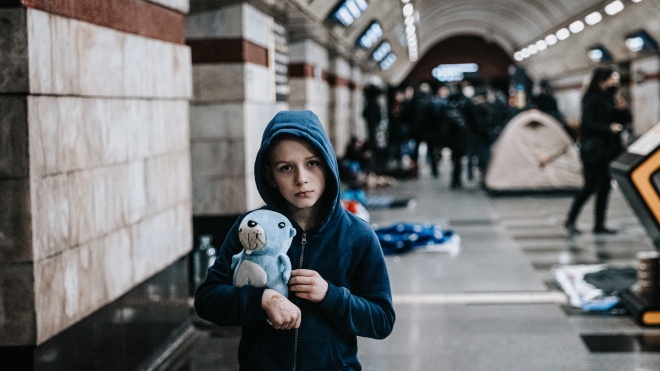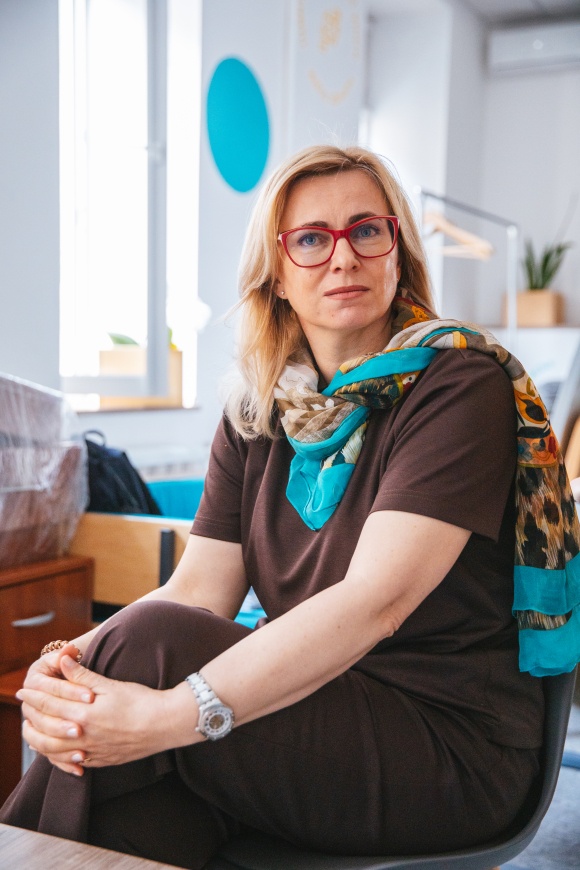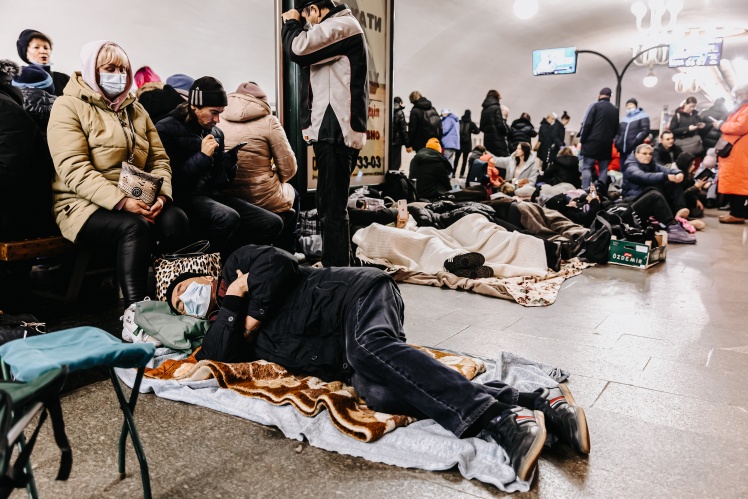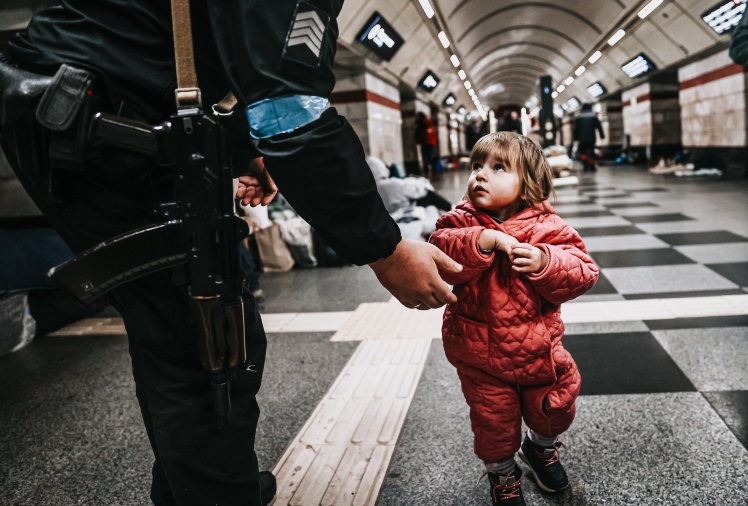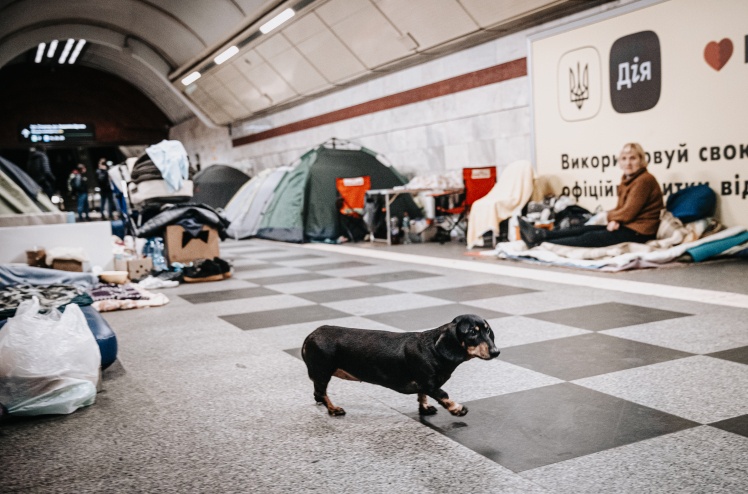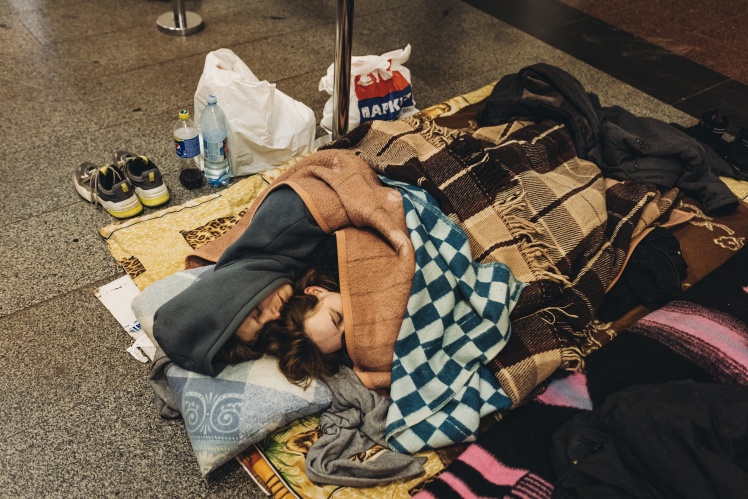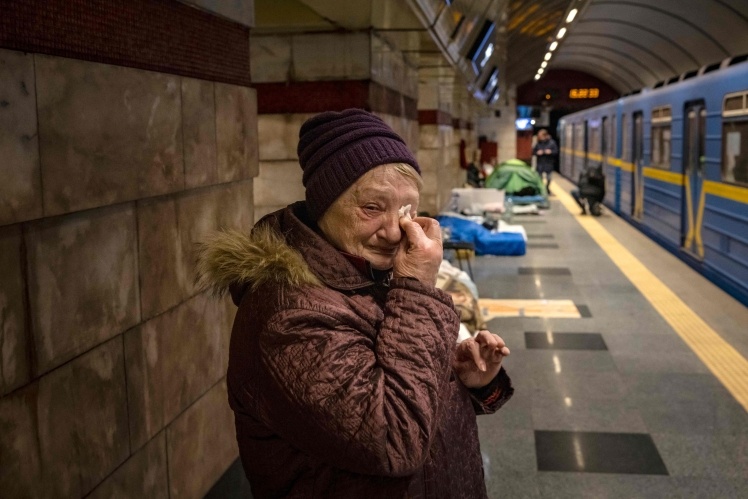It all started with borscht for the Territorial Defense.
— In our Service for Children of Kyiv there was Territorial Defense, TD, — the official of Kyiv State City Administration Tetyana Guzenko tells me. — I live nearby, and, of course, we all talked to each other. When the war broke out, the sons of some of my colleagues went to TD. I was told: "Tanya, they are fed dry food there, we need to help the boys." Actually, my task was to bring a big pot. There were four of us — PhDs and professors — and we started cooking borscht.
Lidia Novak is a psychologist and head of one of the cityʼs Childrenʼs Centers. The local TD unit was located in the office of this organization. Thatʼs why she helped the defenders from the first days — her son also served there.
Lydia Novak
Alex Kuzmin / «Babel’»
— You donʼt understand what TD is, itʼs your first experience, — Novak recalls. — The first weeks were just awful! They [the defenders] all had temperatures. There were no medicines, terrible queues in pharmacies. I was probably doing everything then. Stood in line, looking for medicine, supported the guys. I perceived for myself that they are all like my children, my loved ones.
— But we also thought: what else can we do besides borscht? — adds Tetyana Guzenko. — The thought of the subway [shelters] came immediately.
After the Russian invasion, the Kyiv Metro stopped working as usual — trains ran once an hour, in between air alarms, and some stations didnʼt work at all. The subway has become the main bomb shelter for thousands of Kyivites.
— We were constantly moving around the city, so we could see whatʼ happening, — says Lidia Novak. — We saw grandparents, confused mothers with children. We thought: how can we help them? It was decided that in this situation people need first aid. And where to go to provide it, if not in the subway? Many people left Kyiv then, and those who remained fled there. There was a large crowd of humans — disorganized, scared for themselves and their loved ones. Thank God that there also were people who took over the processes of internal organization. But they didnʼt know how to give advice in case of excessive anxiety, fear, or panic attacks.
It wasnʼt easy to find psychologists — many of them left Kyiv. Tetyana Guzenko was looking for specialists who stayed in the city and were ready to volunteer at metro stations. Among those who didnʼt leave Kyiv was Doctor of Psychology Halyna Bevz.
Galina Bevz
Alex Kuzmin / «Babel’»
— In the last weeks [before the invasion], my colleague said that there would be a war, — Halyna recalls. — And she left, and left early. At seven in the morning [on February 24], I got a call and was told that the war had begun. I immediately thought about this employee. I asked myself: if I had paid more attention to her words, would I have left the city? And I realized that no, I wouldnʼt. Every evening, the remaining neighbors came to see me. We discussed who left Kyiv, what the situation was and what to do next. And every time we decided to stay.
— Why did you decide not to leave? — I ask.
— I asked myself about this several times. After all, many of my acquaintances left. You see, there are professions, military, medical, which become extremely important at a certain time. So is the profession of a psychologist. Well, why should I be a psychologist, if at a time when my profession is needed sp much, I just turn around and leave?
At the metro stations, psychologists worked in groups of two or three. They carried the so-called "psychologistʼs suitcase" with water, some toys for children and rosaries for adults: small movement skills help people in a state of stress to calm down.
— What were your first impressions of the subway in those days? — I ask Lidia.
— I never thought there were mosquitoes in the subway! — She replies. — It sounds primitive, but when I saw the bitten face of a two-year-old boy, it was a shock to me.
— I remembered the glass pupils of peopleʼs eyes, — adds Tetyana. — They were just shouting silently.
— There are a lot of people with various diseases and problems, — continues Lidia. — If you take the Syrets station, in the first days there were up to two thousand people on the platform. Plus 27 dogs and 17 cats. Imagine this. There was nowhere to go.
Getty Images / «Babel'»
It was difficult to work with people. Psychologists recall that they tried not to intrude, and if a person did not come into contact — not to force him or her to do this. Many were afraid to approach or tell their story. Lidia Novak says that one of the reasons for such behavior is the low culture of psychological care in Ukraine.
— People are still afraid to go to psychologists because they are ashamed. And our mentality insists: I will cope on my own, I donʼt need any help, — she says. — There was one woman who just kept walking around us, but didnʼt come close. We talked to the volunteers at the station, and they said that her story is very difficult. We approached such people ourselves.
Next, it was important to build a dialogue. The main thing, explains Lidia Novak, is to clearly distinguish what can be said to people in such a situation and what canʼt. For example, a specialist canʼt give that a person will definitely return to his or her home because no one knows this for sure. You canʼt say, "Donʼt worry, everythingʼs fine." And you canʼt say standard phrases like "I understand you."
— We canʼt understand this person because we werenʼt in her shoes and didnʼt go through what she did, — explains Lidia Novak. — But we are ready to support, to hear, to listen. Tell us, what is your urgent need? We are ready to help.
— What is the most memorable story from those days?
— A duty officer from one of the metro stations approached me and asked to help a woman. She was under occupation for 40 days in a village near Ivankiv. During the occupation, her old mother could not stand it emotionally, she began to have mental disorders. She was there with her daughter and two grandchildren — a boy and a girl, about 8 and 10 years old. They also had processes at the level of emotional manifestations, plus physiology could not stand [the stress], enuresis began. For forty days they had just water and potatoes — thatʼs all the orcs left for them. Her son, who went to defend his land, came under fire and his leg was torn off. Do you understand? She lost her sleep, she couldnʼt go home. I remember when after talking to her I was climbing the metro escalator, and my hands were shaking.
Getty Images / «Babel'»
— How did you cope with this?
— Nobody canceled empathy. Of course, it was difficult. You sit, trying to understand what you have been told, and the person seems to expect that you know the answers to all questions. But you are a mere mortal, and you are also trying to deal with it somehow. But do you know why you go back [to work in the subway]? Because you see the result. They call you and say: “Thank you, today I fell asleep for the first time [after a while]. Today I slept at home for the first time, not in the subway. You told me what to tell my child about, I did it, and it worked." Such things inspire you and give you some inner strength.
In early April, Kyiv Oblast was liberated from the occupiers. The subway was gradually returning to its normal work schedule, which meant that people had to vacate metro cars where they lived. It also created conflict situations, which psychologists helped to resolve.
Tetyana Guzenko adds that psychologists performed many functions then, primarily the ones which social workers generally cover. Many of those who lived in the subway came from the occupied territories or from hot spots. They didnʼt know anything in Kyiv, so they had to explain to whom and how to turn for help.
— But the feedback was amazing! — Adds Tetyana. — One girl wrote me: "Thank you for your help, you helped me a lot. Now Iʼm participating in rallies in support of Mariupol."
And people write or call with the words "I have no one in Kyiv but you." Or ask for the opportunity just to drink tea together.
Tatiana Guzenko
Alex Kuzmin / «Babel’»
— You know, itʼs such a continuous pain and intolerance, — sighs Lidia Novak. — "Why should all these people be here?" How to make them come back? And there was a feeling of incredible tenderness, I wanted to embrace everyone. Itʼs like living for them, just to reduce this level of pain.
Currently, psychologists continue to work, although not in the subway. Their initiative was immediately supported by the UN Women in Ukraine project. Tetyana Guzenko says this is the first time she remembers when the international structure responded in time without any bureaucracy. Every week psychologists gather for training. There they learn to help people who survived the war. Psychologists are now working with social workers, who in turn are working with IDPs. After Kyiv Oblast was liberated, more and more people from the occupied territories came to the capital. Many of them lost their homes or relatives.
— Social workers are constantly confronted with stories that are shocking, — says Tetyana Guzenko. — And they also often donʼt know how to react, what to answer the victims.
At the trainings, psychologists study the experience of other countries that also survived the war. But there are no universal recipes, Guzenko adds.
— You know, we have never had such a situation in the country. What happened in 2014 was, so to speak, just a preparation for what is happening now, — she said. — And the whole country is going through this. We will all have one common collective trauma.
Getty Images / «Babel'»
Translated from Ukrainian by Anton Semyzhenko.
Support Babel:🔸donate in hryvnia 🔸in cryptocurrency 🔸via PayPal: [email protected].
